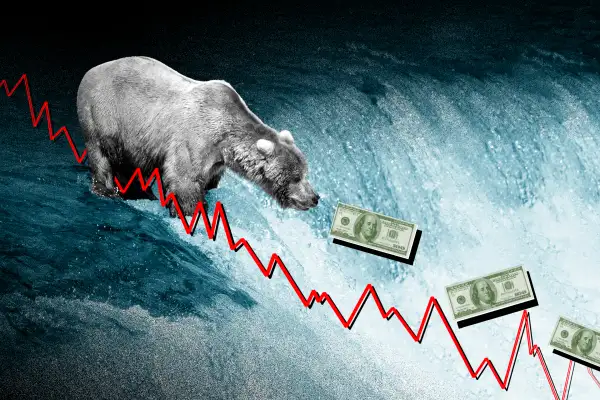Here's How Much Cash Investors Should Hold During a Bear Market (and Potential Recession)
Money is not a client of any investment adviser featured on this page. The information provided on this page is for educational purposes only and is not intended as investment advice. Money does not offer advisory services.

It's always important for investors to have cash on hand for emergencies. But when stocks are in a bear market and inflation is running rampant, you may be especially worried about having enough to cover any surprise expenses.
The S&P 500 — an index commonly used to measure how stocks are doing overall — fell into a bear market this month, meaning its price plunged at least 20% from its previous high. While a bear market can be scary, especially after years of stocks hitting record high after record high, it's a good opportunity to take stock of your financial situation.
"Bear markets give all investors a chance to pause and re-examine their investment strategies," says Heather Winston, a certified financial planner (CFP) and director of financial planning and advice at Principal Financial Group.
But when markets are down, it's easy for people to start letting their emotions dictate their actions, she adds. Watching a your balance dwindle can lead to fear and panic-selling.
That's why it's crucial to keep a long-term approach to your investing plan, including how much cash to have on hand. (To be clear, we're not talking about shoving stacks of dollar bills under your mattress or burying cash in the backyard, but instead keeping money where it can be easily accessed without having to face withdrawal penalties and taxes.)
Here's what to know about how much cash you should hold, and how to make sure you don't miss a buying opportunity, during a bear market.
How much cash should investors hold?
While there is no one-size-fits-all number when it comes to how much cash investors should hold, financial advisors typically recommend having enough money to cover three to six months of expenses readily available.
But Bill Van Sant, a CFP and senior vice president of wealth management firm Girard, recommends holding closer to six to nine months' worth of expenses, and up to one year's worth when a recession is potentially on the horizon.
While experts seem split on whether we're nearing a recession, fears of an economic downturn are running wild. (Tesla CEO Elon Musk recently said a U.S. recession was "inevitable" in an interview with Bloomberg News, and Fed Chairman Jerome Powell has said a recession is "certainly a possibility," just to name a few.) Plus, bear markets are typically followed by recessions.
If you know you have large expenses coming up, like a wedding or a big trip, you'll also want to take those into account when considering how much cash to hold, says Bradley Newman, CFP and financial advisor at wealth management firm Fort Pitt Capital Group. And if you're planning to retire in the near term, you likely want to create even more of a cash cushion for that transition.
In general, cash is an important part of a portfolio as it provides diversification and liquidity, Winston says.
Is it possible to hold too much cash?
While you want to have the proper amount of cash available, remember that there is an "opportunity cost" with holding cash on the sidelines, Newman says. Just look back at the short bear market of 2020, when stocks crashed in March at the onset of the pandemic but were up 100% by August 2021.
"When the markets are going up, those dollars sitting in cash for the past several years aren’t earning anything," Newman says. "You’re actually going backwards and losing money relative to inflation."
Inflation is certainly a concern at the moment, with costs of goods and services from food to cars at a 40-year high.
That means that now, when prices are down, you may have an opportunity to buy. If you have a large amount of cash sitting around, there's a chance now to start dollar-cost averaging, meaning investing regular amounts of money in intervals, Van Sant says. Doing this will allow you to benefit when stocks do recover.
Why is it important to hold cash before a bear market hits?
If the market downturn caught you by surprise, making you wish you had more cash on hand to alleviate anxiety, now's a good time to prepare for the next one.
“Having that liquidity during a bear market is the equivalent of insurance," Newman says. "You need to have that before your house catches fire."
You also want to avoid selling during a bear market as much as you can. When the stock market is down 20%, it becomes a good time to put money to work. But you should probably avoid liquidating because you’re selling at a 20% discount, Newman adds.
Where should you keep your cash?
You don't want to keep your cash somewhere its balance will fluctuate and where you'll have to pay taxes on withdrawals — like the stock market.
However, you can still earn some interest on that cash. High-yield savings accounts, for example, are one place to park your money and enjoy interest. And it's a good time to do so: After years of dropping the annual percentage yields on these accounts, online banks like Ally and Marcus by Goldman Sachs are
More from Money:
Does This Bear Market Mean a Recession Is Coming?
